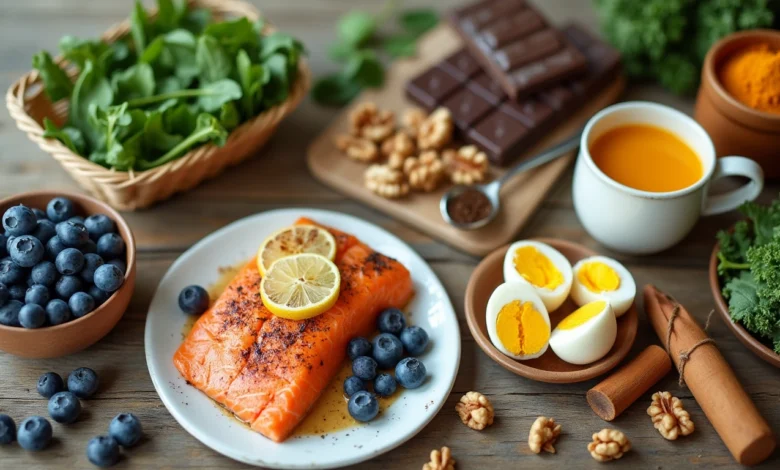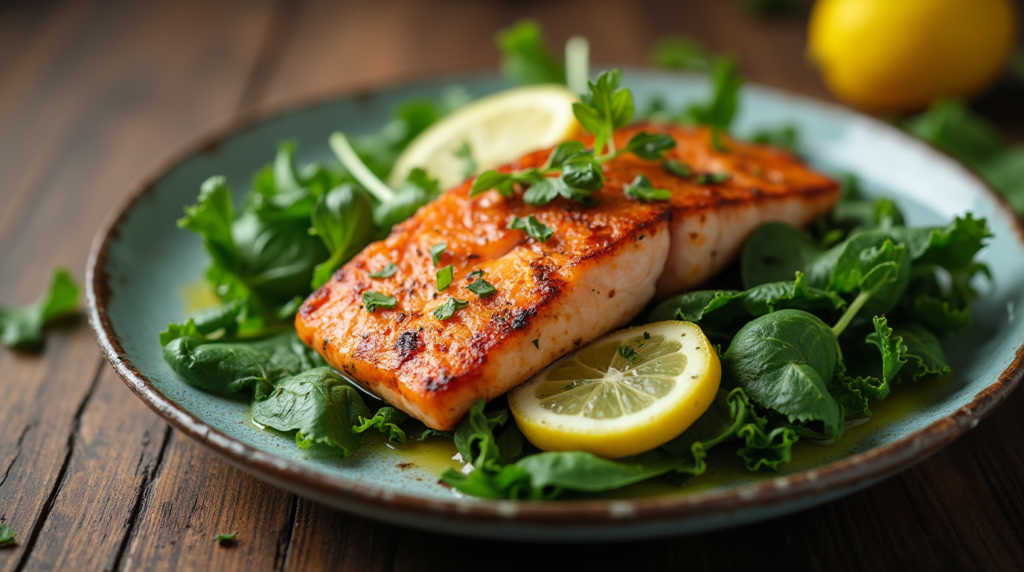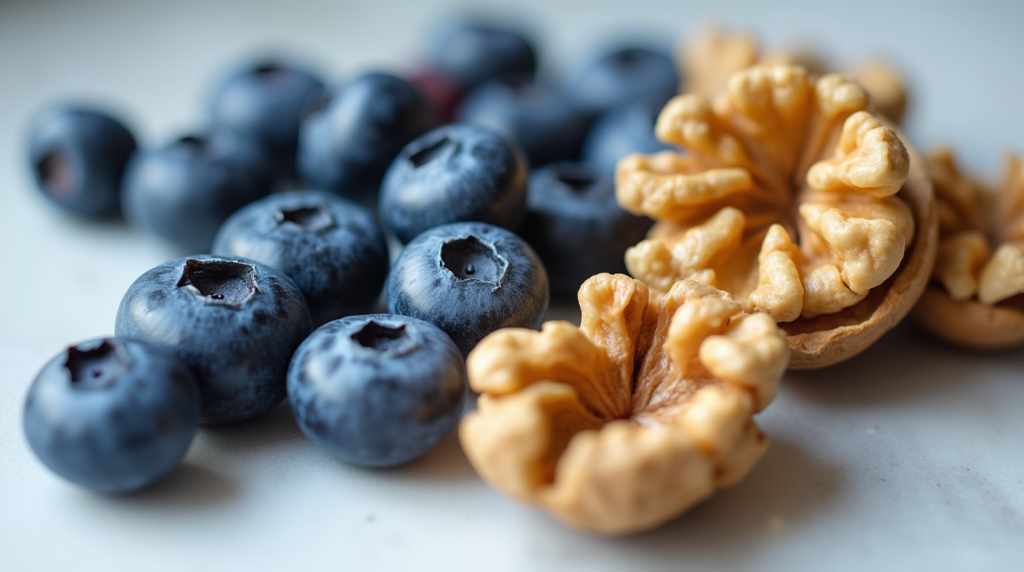Top 7 Foods to Boost Brain Health in Seniors

As we age, maintaining brain health becomes increasingly important. A sharp mind not only helps us stay independent but also enhances our quality of life. While activities like brain exercises and physical fitness play a role, nutrition is one of the most powerful tools for supporting cognitive function. In this article, we’ll explore the top 7 foods to boost brain health in seniors, backed by science and easy to incorporate into your daily diet. Let’s dive in!
Table of Contents
Why Foods to Boost Brain Health in Seniors Matter
Your brain is a powerhouse that requires the right fuel to function at its best. The foods you eat can either support or hinder cognitive function. A diet rich in antioxidants, healthy fats, vitamins, and minerals can protect the brain from oxidative stress, reduce inflammation, and improve memory and focus.
For seniors, focusing on brain-boosting foods is especially important because aging can make the brain more vulnerable to damage. By making smart dietary choices, you can help prevent memory loss, slow cognitive decline, and stay mentally sharp.
The Science Behind Foods to Boost Brain Health in Seniors
Research shows that certain nutrients have a profound impact on brain health. For example:
- Antioxidants protect the brain from oxidative stress, which can damage cells.
- Omega-3 fatty acids support brain cell membranes and improve communication between neurons.
- Vitamins and minerals like vitamin E, vitamin K, and folate play key roles in cognitive function.
By incorporating these nutrients into your diet, you’re giving your brain the tools it needs to thrive.
1. Blueberries: The Antioxidant Powerhouse
Blueberries are often called “brain berries” for good reason. They’re packed with antioxidants, particularly flavonoids, which have been shown to improve memory and delay brain aging.
How They Help:
- Protect the brain from oxidative stress.
- Improve communication between brain cells.
- Enhance memory and cognitive function.
How to Enjoy:
- Add a handful of blueberries to your morning oatmeal or yogurt.
- Blend them into a smoothie for a refreshing treat.
- Enjoy them as a snack on their own.
2. Fatty Fish: Omega-3s for Brain Health
Fatty fish like salmon, mackerel, and sardines are rich in omega-3 fatty acids, which are essential for brain health. Omega-3s help build brain cell membranes, reduce inflammation, and support overall cognitive function.

How They Help:
- Improve memory and focus.
- Reduce the risk of cognitive decline.
- Support brain cell repair and growth.
How to Enjoy:
- Grill or bake salmon for a delicious and brain-healthy meal.
- Add canned sardines to salads or whole-grain crackers.
- Try mackerel as a flavorful alternative to other fish.
3. Walnuts: The Brain-Shaped Superfood
Walnuts are not only shaped like the brain—they’re also one of the best nuts for brain health. They’re rich in omega-3s, antioxidants, and vitamin E, all of which support cognitive function.
How They Help:
- Protect the brain from oxidative damage.
- Improve memory and learning.
- Reduce inflammation in the brain.
How to Enjoy:

- Snack on a handful of walnuts between meals.
- Add chopped walnuts to salads or baked goods.
- Blend them into a smoothie for added crunch.
4. Leafy Greens: Nutrient-Dense Brain Food
Leafy greens like spinach, kale, and broccoli are packed with vitamins, minerals, and antioxidants that support brain health. They’re particularly high in vitamin K, which is known to improve cognitive function.
How They Help:
- Slow cognitive decline.
- Improve memory and focus.
- Protect the brain from oxidative stress.
How to Enjoy:
- Add spinach or kale to your morning smoothie.
- Sauté broccoli with garlic and olive oil for a tasty side dish.
- Make a nutrient-packed salad with mixed greens.
5. Dark Chocolate: A Sweet Treat for Your Brain
Yes, chocolate can be good for you—especially dark chocolate with at least 70% cocoa content. It’s rich in flavonoids, which improve blood flow to the brain and enhance cognitive function.
How It Helps:
- Boosts memory and focus.
- Improves mood and reduces stress.
- Protects the brain from oxidative damage.
How to Enjoy:
- Enjoy a small square of dark chocolate as an afternoon treat.
- Add cocoa powder to your smoothies or oatmeal.
- Pair dark chocolate with nuts or berries for a brain-boosting snack.
6. Turmeric: The Golden Spice for Brain Health
Turmeric, a bright yellow spice, contains curcumin, a compound with powerful anti-inflammatory and antioxidant properties. Curcumin has been shown to improve memory and reduce the risk of cognitive decline.

How It Helps:
- Reduces inflammation in the brain.
- Improves memory and mood.
- Protects against Alzheimer’s disease.
How to Enjoy:
- Add turmeric to soups, stews, or curries.
- Make a golden latte with turmeric, milk, and a dash of honey.
- Sprinkle turmeric on roasted vegetables for added flavor.
7. Eggs: Choline for Cognitive Function
Eggs are a great source of choline, a nutrient that supports brain health by aiding in the production of acetylcholine, a neurotransmitter involved in memory and learning.
How They Help:
- Improve memory and cognitive function.
- Support brain cell communication.
- Provide essential nutrients like vitamin B12 and folate.
How to Enjoy:
- Start your day with scrambled or boiled eggs.
- Add eggs to salads or sandwiches for a protein boost.
- Make a veggie-packed omelet for a brain-healthy meal.
How to Incorporate Foods to Boost Brain Health in Seniors into Your Diet
Here are some practical tips for making these brain-boosting foods a regular part of your meals:
- Plan Ahead: Create a weekly meal plan that includes these foods.
- Snack Smart: Keep healthy snacks like walnuts, blueberries, and dark chocolate on hand.
- Experiment with Recipes: Try new recipes that feature these ingredients, like salmon salads or turmeric-spiced soups.
- Stay Consistent: Aim to include at least one brain-boosting food in every meal.
FAQs About Foods to Boost Brain Health in Seniors
1. Can these foods really improve memory?
Yes! Foods rich in antioxidants, healthy fats, and essential nutrients can protect the brain, improve memory, and slow cognitive decline.
2. How often should I eat these foods?
Aim to incorporate these foods into your diet regularly. For example, eat fatty fish 2-3 times a week and include leafy greens in your meals daily.
3. Are supplements a good alternative to these foods?
While supplements can help, it’s best to get nutrients from whole foods whenever possible. Always consult your doctor before starting any supplements.
4. Can I still enjoy my favorite foods?
Absolutely! A balanced diet includes room for treats. Focus on adding brain-boosting foods while enjoying your favorites in moderation.
5. What other lifestyle changes support brain health?
In addition to a healthy diet, staying mentally active, exercising regularly, and managing stress are key to maintaining brain health. For more tips, check out our article on Best Ways to Prevent Memory Loss in Seniors.
Conclusion: Nourish Your Brain, Nourish Your Life
Your brain is one of your most valuable assets, and the foods you eat play a crucial role in keeping it healthy and sharp. By incorporating these top 7 foods to boost brain health in seniors into your diet, you’re not just supporting your memory—you’re enhancing your overall quality of life.
Start small, experiment with new recipes, and enjoy the process of nourishing your brain. Remember, it’s never too late to make positive changes. Your brain will thank you!
External Links:
1. Harvard Health Publishing: Foods Linked to Better Brainpower
Link: https://www.health.harvard.edu/mind-and-mood/foods-linked-to-better-brainpower
Why Include It: This article from Harvard Medical School provides scientific insights into how certain foods can improve brain health, making it a credible and authoritative source.
2. Mayo Clinic: Omega-3 Fatty Acids and Brain Health
Link: https://www.mayoclinic.org/diseases-conditions/alzheimers-disease/expert-answers/omega-3/faq-20058140
Why Include It: Mayo Clinic is a trusted medical resource, and this page explains the role of omega-3 fatty acids in brain health, which ties directly to the section on fatty fish.
3. National Institute on Aging: Cognitive Health and Older Adults
Link: https://www.nia.nih.gov/health/cognitive-health-and-older-adults
Why Include It: This resource from the National Institute on Aging provides comprehensive information on maintaining cognitive health, which complements the article’s focus on brain-boosting foods.
4. WebMD: Turmeric and Brain Health
Link: https://www.webmd.com/diet/ss/slideshow-turmeric-health-benefits
Why Include It: WebMD is a well-known health resource, and this page highlights the benefits of turmeric, including its impact on brain health.




